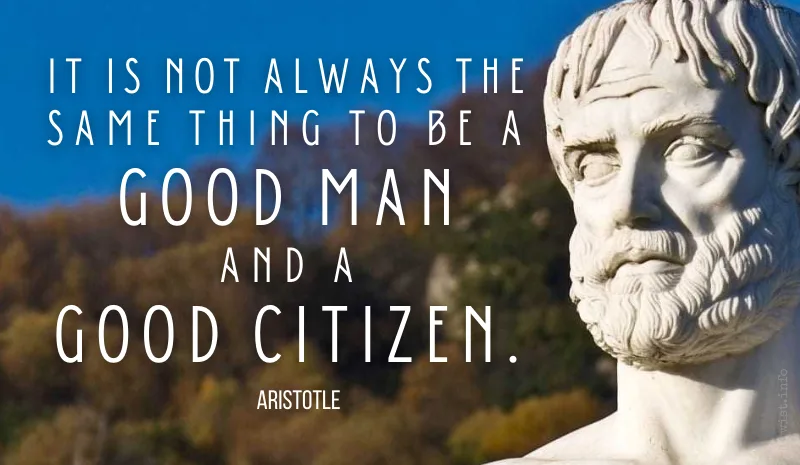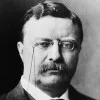For of course it is not always the same thing to be a good man and a good citizen.
[οὐ γὰρ ἴσως ταὐτὸν ἀνδρί τ᾽ ἀγαθῷ εἶναι καὶ πολίτῃ παντί.]
Aristotle (384-322 BC) Greek philosopher
Nicomachean Ethics [Ἠθικὰ Νικομάχεια], Book 5, ch. 2 (5.2.11) / 1130b.29 (c. 325 BC) [tr. Thomson (1953)]
(Source)
Aristotle suggests the distinction comes when a regime is corrupt or unjust, at which point carrying out the duties of a good citizen (supporting the regime) may not align with an individual's virtues.
See also Aristotle, Politics.
(Source (Greek)). Alternate translations:For perhaps it is not the same thing to be a good man, and a good citizen.
[tr. Taylor (1818), 5.2]It may be it is not the same thing to be a good man and a good citizen in every case.
[tr. Chase (1847), 5.4]The perfection of the man is not perhaps in all cases identical with the perfection of the citizens.
[tr. Williams (1869), 5.2]It is possibly not the same thing in all cases to be a good man and to be a good citizen.
[tr. Welldon (1892), 5.5]It is possible that to be a good man is not the same as to be a good citizen of any state whatever.
[tr. Peters (1893), 5.2]Perhaps it is not the same to be a good man and a good citizen of any state taken at random.
[tr. Ross (1908), 5.2]It would seem that to be a good man is not in every case the same thing as to be a good citizen.
[tr. Rackham (1934), 5.2.11]For being a good man is presumably not in every case the same as being a good citizen.
[tr. Reeve (1948)]For perhaps to be a good man is not the same as to be a good citizen in every case.
[tr. Apostle (1975)]Presumably it is not always the same thing to be a good man and a good citizen.
[tr. Thomson/Tredennick (1976)]For, presumably, being a good man is not the same as being every sort of good citizen.
[tr. Irwin/Fine (1995)]For, presumably, being a good person is not in every case the same as being a good citizen.
[tr. Crisp (2000)]For perhaps it is not the same thing in every case to be a good man and to be a good citizen.
[tr. Bartlett/Collins (2011)]
Quotations about:
citizen
Note not all quotations have been tagged, so Search may find additional quotes on this topic.
There is nothing to be done with that type of citizen of whom all that can be said is that he is harmless. Virtue which is dependent upon a sluggish circulation is not impressive. There is little place in active life for the timid good man.
Theodore Roosevelt (1858-1919) American politician, statesman, conservationist, writer, US President (1901-1909)
Speech (1910-04-23), “Citizenship in a Republic [The Man in the Arena],” Sorbonne, Paris
(Source)
JUSTICE, n. A commodity which in a more or less adulterated condition the State sells to the citizen as a reward for his allegiance, taxes, and personal service.
Ambrose Bierce (1842-1914?) American writer and journalist
“Justice,” The Cynic’s Word Book (1906)
(Source)
Included in The Devil's Dictionary (1911). Originally published in the "Devil's Dictionary" column in the San Francisco Wasp (1886-01-09).
All citizens do have a measure of control, at least in democracies where their votes are counted, of how they belong to their nations. Perhaps they will have more confidence in unconventional choices if they see that each nation’s founders were disobedient and unpredictable, men and women of imagination and ambition. The steel of every national monument was once molten.
Timothy Snyder (b. 1969) American historian, author
The Red Prince, “Orange: European Revolutions” (2008)
(Source)
The mass of men serve the State thus, not as men mainly, but as machines, with their bodies. They are the standing army, and the militia, gaolers, constables, posse comitatus, etc. In most cases there is no free exercise whatever of the judgment or of the moral sense; but they put themselves on a level with wood and earth and stones; and wooden men can perhaps be manufactured that will serve the purpose as well. Such command no more respect than men of straw or a lump of dirt. They have the same sort of worth only as horses and dogs. Yet such as these even are commonly esteemed good citizens.
Henry David Thoreau (1817-1862) American philosopher and writer
Essay (1849-05), “Resistance to Civil Government [On the Duty of Civil Disobedience],” Æsthetic Papers, No. 1, Article 10
(Source)
Based on an 1848 lecture at the Concord Lyceum.
It is a trite yet urgently true observation that if America is to remain a first-class nation, it cannot have second-class citizens.
Martin Luther King, Jr. (1929-1968) American clergyman, civil rights leader, social activist, preacher
“The Negro and the American Dream,” speech, North Carolina NAACP, Charlotte (1960-09-25)
(Source)
King used this line in several of his speeches at the time.
The first requisite of a good citizen in this republic of ours is that he shall be able and willing to pull his weight; that he shall not be a mere passenger, but shall do his share in the work that each generation of us finds ready to hand; and, furthermore, that in doing his work he shall show, not only the capacity for sturdy self-help, but also self-respecting regard for the rights of others.
Theodore Roosevelt (1858-1919) American politician, statesman, conservationist, writer, US President (1901-1909)
Speech (1902-11-11), State Chamber of Commerce Banquet, New York City
(Source)
This first part of this passage was quoted by Ronald Reagan at a fundraising dinner for Sen. Mack Mattingly in Atlanta (1985-06-05), discussing reform measures to close up tax loopholes.
For politics ought to be the part-time profession of every citizen who would protect the rights and privileges of free people and who would preserve what is good and fruitful in our national heritage. Politics must be the concern of every citizen who wants to see our national well-being increased and our international leadership strengthened. In that combined sense, politics is the noblest of professions. In the ranks of that kind of politics, every American should be enrolled.
Dwight David Eisenhower (1890-1969) American general, US President (1953-61)
Speech, Republican Lincoln Day Dinners (28 Jan 1954)
(Source)
Often paraphrased: "Politics ought to be the part-time profession of every citizen who would protect the rights and privileges of free men."
The speech was filmed for the Republican National Committee and distributed to state and local committees to be shown at the Lincoln Day dinners.
But freedom isn’t free. It shouldn’t be a bragging point that, “Oh, I don’t get involved in politics,” as if that makes someone cleaner. No, that makes you derelict of duty in a republic. Liars and panderers in government would have a much harder time of it if so many people didn’t insist on their right to remain ignorant and blindly agreeable.
Every honest and God-fearing man is a mighty factor in the future of the Republic. Educated men, business men, professional men, should be the last to shirk the responsibilities attaching to citizenship in a free government. They should be practical and helpful — mingling with the people — not selfish and exclusive. It is not necessary that every man should enter into politics, or adopt it as a profession, or seek political preferment, but it is the duty of every man to give personal attention to his political duties. They are as sacred and binding as any we have to perform.
William McKinley (1843-1901) US President (1897-1901)
Speech, Woodstock, Connecticut (4 July 1891)
(Source)
America has never been united by blood or birth or soil. We are bound by ideals that move us beyond our backgrounds, lift us above our interests, and teach us what it means to be citizens. Every child must be taught these principles. Every citizen must uphold them; and every immigrant, by embracing these ideals, makes our country more, not less, American.
It is manifestly possible to be a good citizen without possessing the goodness that constitutes a good man.
[ὅτι μὲν οὖν ἐνδέχεται πολίτην ὄντα σπουδαῖον μὴ κεκτῆσθαι τὴν ἀρετὴν καθ᾽ ἣν σπουδαῖος ἀνήρ, φανερόν.]
Aristotle (384-322 BC) Greek philosopher
Politics [Πολιτικά], Book 3, ch. 4 / 1276b.34 [tr. Rackham (1932)]
(Source)
Note that a similar passage can be found at 1277a12.
(Source (Greek)). Alternate translations:An excellent citizen does not possess that virtue which constitutes a good man.
[tr. Ellis (1776)]It is quite possible that a citizen, though good as such, should not possess the excellence which characterizes a the good man.
[tr. Bolland (1877)]The good citizen need not of necessity possess the virtue which makes a good man.
[tr. Jowett (1885)]That it is possible for a citizen to be excellent yet not possess the virtue in accordance with which he is an excellent man, therefore, is evident.
[tr. Lord (1984)]Evidently, then, it is possible to be a good citizen without having acquired the virtue expressed by a good man.
[tr. Reeve (1998)]
What I have desired to do is to make the people of Boston realize that the most important office, and the one which all of us can and should fill, is that of private citizen. The duties of the office of private citizen cannot under a republican form of government be neglected without serious injury to the public.
Louis Brandeis (1856-1941) American lawyer, activist, Supreme Court Justice (1916-39)
Statement to a reporter, Boston Record (14 Apr 1903)
Quoted in Alpheus Thomas Mason, Brandeis: A Free Man's Life (1946).Commonly paraphrased:
- "The most important office is that of the private citizen"
- "The most important political office is that of the private citizen"
Democracy is the recurrent suspicion that more than half of the people are right more than half of the time.
E. B. White (1899-1985) American author, critic, humorist [Elwyn Brooks White]
“Notes and Comments,” New Yorker (3 Jul 1943)
(Source)

















